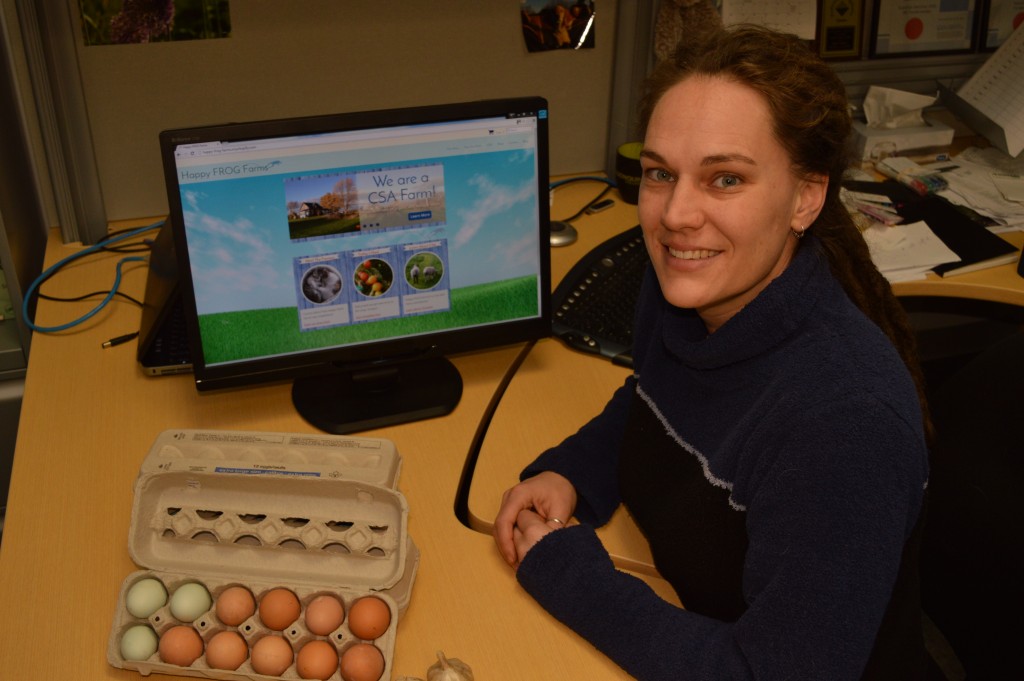Thanks to a website created by Algonquin students, customers can now order farm-fresh food online and have it delivered to the Woodroffe or Perth campus.

The website is for local business Happy FROG Farms. It was finished in December by second-year interactive multimedia developer students and will go live this month.
The farm is the brainchild of Kathryn Reilander, co-ordinator of the electrical engineering technology program, and her partner Kerry Milford, project manager for Applied Research and Innovation at the Perth campus.
“The team did a remarkable job on the website,” said Reilander. “They were just a really good team to work with.”
Happy FROG Farms has nothing to do with frogs. FROG stands for Free Range Organic Garden. The farm’s animals are free range, meaning they have access to outdoor spaces.
Reilander and Milford follow organic principles by not using pesticides or chemicals on their fruits and vegetables and using their animals’ manure as fertilizer.
Most of the farm’s sales are by word of mouth, but the website will help expand the business online.
“I bring in eggs every day,” said Reilander, who works in the ACCE building. “Everybody on this floor buys my eggs.”
Second-year students Angel Gallinger, Tyler Klepsch, Marina Milette, and Yanrong Zhu had never worked with a client before when they were asked to make the website for a project development class. Fortunately, Reilander and Milford were easy to work with and their passion for the farm was infectious.
“Kerry and Kat were awesome, their concept of the farm is really great,” said Gallinger.
“I’m into the environment, and they’re into the environment, so it worked well that way.”
The project took three months, and was not without difficulty. Making a website had more steps than the team realized.
“If we had known what all the steps were, we would have been two steps ahead the whole time,” said Gallinger. “It was a great thing to learn, but it was stressful for me.”
Once they decided who was going to design, develop and organize the site’s content, the team got down to work. They planned out the website’s skeleton and found different colours and images for Reilander to choose from.
Reilander picked a design inspired by the song segment Zip-A-Dee-Doo-Dah from Disney’s movie Song of the South. In the song, different animals get along on a farm with green grass and blue skies. This was a good representation of her farm, where goats, ducks, dogs and cats all hang out in the same field.
The main challenge for developers Zhu and Klepsch was learning the programming language for Shopify, the e-commerce platform they chose to run the site. Shopify is an Ottawa company that makes e-commerce platforms for small businesses.
Now that they know Shopify’s language, Zhu and Klepsch have an advantage if they ever want to work there.
“Sure, why not, if they’d give me a job offer,” said Zhu.
Klepsch also had the challenge of making the website look good on tablets and smartphones, as well as on computer screens.
“When you’re redesigning a template, things break and you have to figure out why things break,” said Klepsch.
Milette, the head designer, designed a silhouette of a jumping frog for the site’s logo. She couldn’t find any other frogs images online that looked professional.
Reilander and Milford started the farm outside Smiths Falls four years ago to grow more of their own food. They wanted to avoid buying food shipped from far away, which uses large amounts of fossil fuels and meat grown with hormones.
From the humble beginnings of three chickens bought off Kijiji, today Happy FROG Farms raises 300 meat chickens every summer in addition to fruit, vegetables and herbs.
“I think people notice a difference between my eggs and commercial eggs,” said Reilander. “People should buy local and we’re allowing people to do this.”
The farm has limited products in the winter months, but production will start up again in the spring. Customers can tour the farm online at happyfrogfarms.com, or book a real-life tour at


